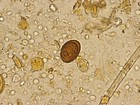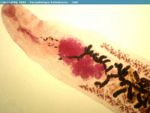Dicrocoelium dendriticum
| Also known as: | Dicrocoelium lanceolatum
|
Scientific Classification
| Kingdom | Animalia |
| Phylum | Platyhelminthes |
| Class | Trematoda |
| Order | Diagiorchiida |
| Family | Dicrocoeliidae |
| Genus | Dicrocoelium |
| Species | D. dendriticum |
Hosts
Intermediate hosts: Land snails, mainly Zebrina detrita within Europe. Brown ants of the genus Formica are also required for completion of the life cycle.
Definitive hosts: D. dendriticum is most commonly seen in sheep, cattle, deer, and goats, but is occasionally seen in horses and pigs.
Identification
The adults measure anything between 6mm and 1.0cm long, and are semi transparent. The eggs are small dark-brown and are shed in the faeces by the infected host.
Life Cycle
After mating, the eggs are excreted in the faeces. The first intermediate host, the snail, eats the faeces and ingests the infective larvae. The larvae then grow and develop in the host. The larvae are then extruded in the slime. This phase requires around 3 months for completion.
The slime balls are then ingested by the ant, along with the developing larvae, known as cercariae. In the ant they mature into metacercariae. The presence of metacercariae in the nerve ganglia of the ants makes them revert to a primitive behaviour pattern, whereby they cling onto herbage overnight instead of retreating to the nest enhancing the likelihood of being eaten by grazing animals
Infection of the definitve host is via ingestion of ants, mainly on the pasture. The metacercariae moult into immature flukes and migrate directly up the bile duct into the liver.

